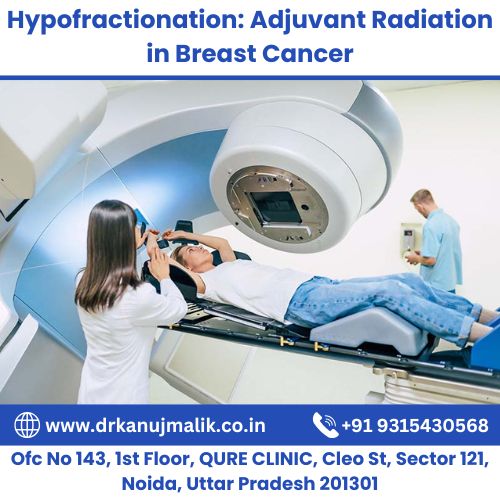Breast cancer is one of the most prevalent cancers affecting women in India, and its treatment landscape has evolved significantly over the past few years. The incorporation of advanced therapies, such as hypofractionated radiation, is changing the way we approach breast cancer care.
As an experienced breast cancer specialist in Noida, I am always keen to ensure that my patients receive the most effective and efficient treatment options available. One of these innovative treatments is hypofractionation, which is gaining traction in the management of breast cancer.

What is Hypofractionation?
In breast cancer treatment, radiation therapy is often used after surgery to eliminate any remaining cancer cells, thus reducing the risk of recurrence. Traditionally, radiation is delivered in small doses (fractions) over a period of five to six weeks.
However, hypofractionation is a newer approach where larger doses are delivered over fewer sessions, typically reducing the treatment time to three to four weeks.
This method has been found to be equally effective as the standard radiation therapy schedule in treating early-stage breast cancer while offering significant benefits in terms of convenience for patients.
How Hypofractionation Works in Breast Cancer Treatment?
Adjuvant radiation therapy is a key part of treatment following breast-conserving surgery, where the goal is to eradicate any microscopic cancer cells that may be left behind. Hypofractionated radiation uses larger doses delivered over fewer sessions to achieve similar outcomes in terms of tumour control and prevention of recurrence.
Multiple studies and clinical trials have shown that hypofractionated radiation can be just as effective as the traditional method, while also reducing the burden on patients.
With fewer treatment sessions, patients benefit from a more convenient treatment schedule, which is especially helpful in a country like India, where access to healthcare can sometimes be challenging.
The Benefits of Hypofractionation in India
In India, breast cancer cases are rising, and the need for efficient and affordable treatment options has never been more crucial. Hypofractionation offers numerous advantages for Indian patients:
- Reduced Treatment Time: Traditional radiation therapy can take up to six weeks, requiring daily visits to the hospital. Hypofractionated radiation reduces this time to just three to four weeks, making it more manageable for patients who may face logistical or financial barriers to frequent hospital visits.
- Cost-Effective: With fewer treatment sessions, the overall cost of radiation therapy is reduced, making it more affordable for patients, particularly in rural or underserved areas.
- Fewer Hospital Visits: For many patients, the stress and fatigue of daily hospital visits can be overwhelming. Hypofractionation minimizes this burden, enabling patients to get back to their regular lives more quickly while still receiving effective treatment.
As a breast cancer specialist in Noida, I believe that incorporating hypofractionation into treatment regimens can significantly improve the patient experience, especially for those with early-stage breast cancer who are undergoing breast-conserving surgeries.
The Role of Dr. Kanuj Malik in Advancing Breast Cancer Care
Dr. Kanuj Malik, a highly experienced surgical oncologist with 14 years of expertise, is committed to offering advanced and patient-friendly treatments like hypofractionated radiation.
His evidence-based approach, combined with compassionate care, ensures that patients receive not only the most effective therapies but also emotional and psychological support throughout their cancer journey. Dr. Malik continues to stay at the forefront of breast cancer treatment innovations, bringing world-class care to his patients in Noida.
Hypofractionation: A Safer and More Convenient Alternative
Studies have consistently shown that hypofractionation provides similar outcomes in terms of local control of the tumour and the prevention of cancer recurrence. Additionally, by reducing the number of radiation sessions, the risks associated with prolonged radiation exposure, such as late-onset side effects like cardiac toxicity (particularly in left-sided breast cancers), can be minimized.
Hypofractionation is particularly effective for women with early-stage breast cancer who have undergone breast-conserving surgery. However, it is essential to note that not all patients are candidates for this type of treatment. The decision to opt for hypofractionation depends on several factors, including tumour size, stage, and the patient’s overall health.
Moving Forward: The Future of Breast Cancer Treatment
As the medical community continues to research and refine treatment approaches, the adoption of hypofractionation in breast cancer care is expected to grow, especially in developing countries like India.
With its potential to reduce treatment times, improve patient convenience, and lower healthcare costs, hypofractionated radiation offers a promising future for breast cancer patients in India.
As a breast cancer specialist in Noida, I am proud to incorporate these advanced treatment methods into my practice, offering patients access to world-class care right here in India. By continuously updating my knowledge and integrating the latest therapies into my practice, I aim to provide the best possible outcomes for my patients.
Conclusion
The introduction of hypofractionated radiation into breast cancer treatment regimens represents a major leap forward in providing patients with effective, less burdensome care. With fewer sessions and comparable results to traditional radiation methods, this approach aligns with the growing need for efficient cancer care in India.
Under the expert care of a seasoned oncologist like me, patients can be assured that they are receiving cutting-edge treatment that is both scientifically sound and tailored to their specific needs.
If you or a loved one is seeking breast cancer treatment, I invite you to reach out to my clinic. Together, we can explore the best treatment options available to ensure a brighter and healthier future.
Qure Clinic
Address – Shop No 143 1st floor, Cleo Street, near CLEO COUNTY, Sector 121, Noida, Uttar Pradesh, 201301
Email –kanujmalik03@rediff.com
Phone – +91 9315430568
Monday To Saturday – 9:00AM–9:00PM
Sunday closed
Google Map Location Listing – https://g.co/kgs/BfrTkmW
